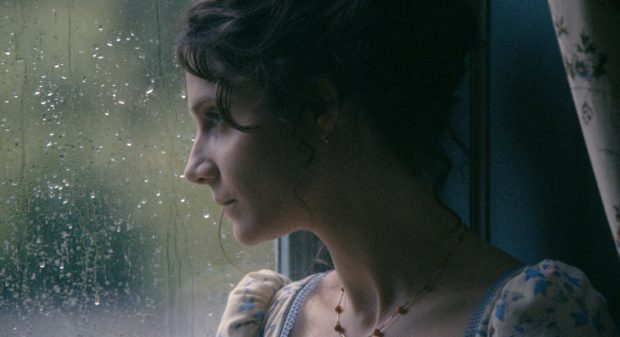Available on Blu-ray Mon 12 Feb 2018
An adaptation of Guy de Maupassant’s Une Vie, A Woman’s Life is a period drama that follows the tragic life of Jeanne, a young French woman who finds her life dictated and destroyed by the men who surround her.
Judith Chelma is breath-taking in the role of Jeanne, a naïve young woman who grows to become a paranoid individual, bitter for having been constantly mistreated over the years. It is no easy feat to convincingly portray an ageing character. Nevertheless, Chelma is remarkable in how she transforms Jeanne from youthful and infantile to an old, ill woman, her face twisted in a permanent look of scorn and resentment as she faces being disappointed once again. The empathy she has for Maupassant’s protagonist is evident and shared with her audience, who cannot help but be engrossed by her story. While we feel immense pity for her – her life reduced to nothing thanks to the careless actions of her husband and son – it is also incredibly infuriating to watch her be repeatedly walked over by them. Despite everything, she refuses to see the worst in her son, and her denial of the truth reveals how broken a figure she has become. As a character study alone, A Woman’s Life is magnificent.
In terms of the film’s production, there are some moments where director Stéphane Brizé just misses the mark. What is so intriguing about the film as it begins is its quietness. The stark absence of music in the film’s opening is surprising, yet the prominent birdsong or plunder of torrential rain perfectly mirror Jeanne’s state of mind. This harmonious relationship between nature and Jeanne contrasts with scenes later on in the film, when a lonely Jeanne finds herself in complete silence. Unfortunately, this bold move on Brizé’s part is eventually withdrawn, as a romantic piece of piano playing is added in reminiscent flashbacks. The repeated melody adds a sentimentality to the film that Chelma’s portrayal does not warrant or deserve. Had Brizé the courage to stick to this initial decision, it would have made A Woman’s Life a more affecting film in its bleak portrayal of the suffering of women.
The complexity of the film’s timeline also gets in the way of making A Woman’s Life perfect. Time in Brizé’s piece is rarely linear; Jeanne’s present narrative is constantly interrupted by moments from her past and future, making it difficult to follow the plot. While the film eventually resigns itself to a bleak, despairing tone, there are thankfully a few small gestures that offer some reprieve to Jeanne’s endless afflictions towards the end. It saves the film from become too morose, without downplaying Jeanne’s hardships.
A Woman’s Life is a quiet yet stirring film that will leave you feeling utterly bereft for Jeanne. Chelma’s performance is exceptional, her pain so convincing that any more suffering would be too much for her and the audience to bear.
